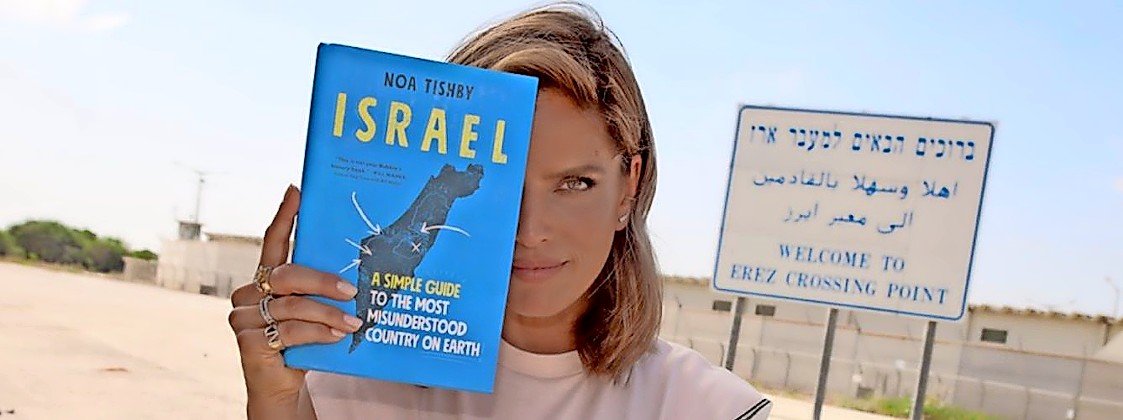Noa Tishby speaks semantics at Duke University
Noa Tishby, 47, Israel’s inaugural special envoy for combating antisemitism and the delegitimization of Israel, is not known for holding punches. Her Feb. 21 talk at Duke University in Durham, NC, was no exception.
At another point in the talk, Tishby told the nearly 200 assembled students: “If you try to tell me that Israel does not have the right to exist, if you try to slander what Zionism is — excuse me, you’re wrong. You’re an idiot.”
An actress whose credits include “Star Trek: Enterprise,” “Charmed” and “NCIS,” she’s the author of “Israel: A Simple Guide to the Most Misunderstood Country on Earth,”
The event was co-sponsored by Duke’s Center for Jewish Studies and Freeman Center for Jewish Life, the Israel on Campus Coalition, Students Supporting Israel and Chabad at Duke. One of the organizers, Duke sophomore and public-policy major Alex Ahdoot, described Tishby as “an absolute superstar.”
To see how normalized anti-Israel sentiments have become, Tishby told those assembled that one need only look to Wikipedia. Israel is the only country to have a page questioning its legitimacy. Not even North Korea has that, she said.
“I asked the audience if they had experienced or witnessed antisemitism online, on campus or off campus. Everyone in the audience raised their hand.” — Noa Tishby
In conversation with activists on campus, who support the BDS movement, Tishby advised students to ask which other countries they want to dismantle. “It’s just one country, and that country just happens to be Jewish,” she said.
To the moderator, public-policy professor David Schanzer, Tishby explained that she titled her book a “simple” guide because supporting Israel isn’t complicated.
“The Jewish people deserve the right to self-determination, self-governance in some parts of their ancestral home,” she said. “That’s it. That’s as simple as it gets.”
But what about the displacement of Arabs with Israel’s founding in May 1948, Schanzer wanted to know? Tishby said that some Arabs left the area, and some were expelled.
“There is no doubt there were things that should not have happened,” she said. But the violence that broke out was not official policy, she added, and is an unfortunate occurrence in many wars and with the creation of many states.
After the event, Tishby told JNS that visiting Duke was important given the university’s “history of problematic speakers and somewhat hostile environment to its Jewish students.” The city of Durham was also the first to ban police training with Israel.
“I understand that the faculty is working towards making their Jewish students feel more accepted, however, I heard from the students themselves that more work needs to be done on some levels,” she told JNS.
Last May, the university’s official Instagram account deleted photos from a Birthright trip following protests. Two months earlier, Students for Justice in Palestine’s Duke chapter hosted Mohammed el-Kurd during “Duke Israeli Apartheid” week. That speaker has accused Israelis of “eating the organs of Palestinians and of having a particular lust for Palestinian blood,” per the ADL.
In May 2021, Duke’s student government vetoed the creation of a Students Supporting Israel (SSI) chapter. In February 2020, swastika graffiti was found painted on a bridge on campus. And when Tzipi Livni, a former longtime Israeli politician, spoke at Duke in October 2019, protesters disrupted her for 20 minutes. (Other swastikas, neo-Nazi fliers and antisemitic posters showed up on campus in 2018 in several separate incidents.)
“Antisemitism is significantly on the rise in our society. During my talk, I asked the audience if they had experienced or witnessed antisemitism online, on campus or off campus. Everyone in the audience raised their hand,” Tishby told JNS.
“We, as Jews and Zionists, need to be loud and proud and stand up for ourselves,” she said. “We cannot be silent in the face of antisemitism.”
Ahdoot returned recently from a 10-day Israel on Campus Coalition trip to Israel and the United Arab Emirates. “She is one of my biggest role models,” said Ahdoot of Tishby. “It’s so important to bring her to show the ways that we could speak on these issues, the ways that we can engage with our peers on these issues, and especially with her, to really just educate and empower us to be loud and proud in our beliefs and our identity.”
Her longtime friend, Duke junior Alanna Peykar, an economics major, is co-founder of Duke’s SSI chapter. Peykar also helped organize the event.
She learned from Tishby that “being pro-Israel, you’re pro-human rights,” and that being pro-peace “goes hand-in-hand with being Zionist,” said Peykar.






